- Top
- Sustainability
- Seven & i Holdings Material Issues
- Material Issues 3
- Climate Change Countermeasures
- Sustainability
- Message from the Representative Director & Executive Chair (Kaicho)
- Basic Policies of Sustainability Initiatives
- Sustainability Management
- Stakeholder Engagement
- Business Partners
- Seven & i Holdings Material Issues
- Corporate Governance
- Compliance
- Information Security and Personal Information Protection
- Human Rights Initiatives
- Human Capital Initiatives
- Climate and Nature-related Information Disclosures —Responses to TCFD/TNFD Recommendations
- Social Contribution Activities
- Business Continuity Initiatives
- Overseas Initiatives
- Sustainability Data Book
- External Recognition and Awards
- SASB/GRI Index
- Index for Researchers
- Keyword search
- Editorial Policy
- Social
- Environment
Climate Change Countermeasures
Seven & i Holdings Co., Ltd. and its consolidated subsidiaries (hereinafter referred to as "our Group") recognize that the issue of climate change exerts a negative impact on the stable society that is essential for the sustainable development of companies. We support international policies such as the Paris Agreement, Japan's Nationally Determined Contributions (NDCs), and various climate-related regulations and policies, including the Energy Conservation Act and the Act on Promotion of Global Warming Countermeasures. We are committed to contributing to the achievement of the greenhouse gas reduction targets set forth in the Paris Agreement. In the “GREEN CHALLENGE 2050” environmental declaration formulated in May 2019, we identified the decarbonized society as the ideal that we should be aiming for. We are promoting energy conservation and the expanded use of renewable energy, with the goal of reducing CO2 emissions generated from store operations by 50% compared to FY2013 by 2030 and down to net-zero by 2050.
Managing Climate Change Risks
Our Group companies conduct a risk identification process based on a common group risk classification twice a year. Along with quantifying risk assessments considering the impact and likelihood of risks, they compile countermeasures for each risk into a risk assessment sheet and submit it to the Seven & i Holdings Corporate Governance Department (Risk Management Committee Secretariat). This risk assessment sheet includes not only quantitative risks but also qualitative risks such as CO2 emission regulations, business continuity risks due to recent large typhoons, and changes in the production areas and fishing grounds of product raw materials.
The Risk Management Committee, which is held twice a year, comprehensively grasps the group's risk situation based on the risk assessments and countermeasures submitted by each group company.
From the perspectives of severity and urgency of improvement, the committee monitors the risk management and improvement efforts of each company. The status of such risk management is, in principle, reported to the Seven & i Holdings Board of Directors once a year. Seven & i Holdings and its group companies analyze and evaluate risks appropriately in each business, considering changes in the business environment and risk factors. To respond accurately, they have established, maintained, and operated an integrated risk management system centered on the Risk Management Committee based on the basic regulations of risk management. Risks related to climate change are also managed under this integrated risk management system.
The Risk Management Committee receives reports on the risk management status of each company from the respective risk management departments, discusses comprehensive risk identification, evaluation, analysis, and countermeasures, and determines future directions. Additionally, the status of such risk management is reported to the Seven & i Holdings Board of Directors once a year, in principle.
In recent years, in addition to changes in the internal environment of our Group, the impact on business activities due to various changes in the external environment, such as CO2 emission regulations, large typhoons, and changes in the production areas and fishing grounds of product raw materials, has been increasing. In the fiscal year 2023, to respond to these changes, the risk management system was reviewed to consider not only short-term risks but also medium- to long-term risks. In the risk evaluation process, qualitative elements such as business continuity and damage to the group's brand image were added to the traditional quantitative elements as evaluation perspectives for the impact on performance if risks materialize. This aims to diversify and enhance the evaluation and analysis of various risks. Furthermore, by identifying high-priority risks from the perspectives of importance and commonality, and clarifying the roles and responsibilities of Seven & i Holdings and its group companies, the effectiveness of risk management across the group is being enhanced.
Measures for Adaptation to and Mitigation of Climate Change Risks
All Our Group stores are committed to an enduring concern around weather and temperature change and this is reflected in our daily ordering and sales floor organization. In product development and lineups as well, we strive to provide products that meet customers’ needs by establishing a hypothesis based on weather changes over several months. At the same time, we will respond carefully to changes in customers’ purchasing behavior driven by abnormal weather and temperature changes affected by climate change.
The "Seven Farm" environmental recycling‒oriented agriculture initiative of Ito-Yokado buys the entire quantity of harvested produce, including imperfect shape/size items. This enables us to procure and sell vegetables steadily regardless of market trends. In this way, we are also addressing the aspect of stable product procurement.
In addition, Seven & i Holdings is establishing systems to prepare for disasters associated with sudden weather phenomena, such as the numerous incidents of heavy rain and landslides that have occurred recently in Japan. For example, we have distributed booklets to employees summarizing how to respond in an emergency, and we have also been holding regular simulation drills using teleconferencing systems and so forth. Furthermore, Seven & i Holdings is constructing 7VIEW (Seven Visual Information Emergency Web), a system that not only consolidates Group-internal information but also enables the provision, sharing, and joint use of disaster information in collaboration with business partners. The system gathers information from the Group and through cooperation with business partners.
Measures to mitigate climate change include various initiatives related to reducing our environmental impact, such as energy conservation and use of renewable energy at stores, along with forest maintenance and related activities throughout Japan.
Operational Status of Seven Farm(in Japan)
| End of February 2022 | End of February 2023 | End of February 2024 | End of February 2025 |
|---|---|---|---|
|
12 places (approx. 250 ha in total) |
11 places (approx. 250 ha in total) |
11 places (approx. 250 ha in total) |
11 places (approx. 250 ha in total) |
Reduction Targets for CO2 Emissions
Approximately 90% of the CO2 emissions by each Our Group company are from the electricity use for store operations. For this reason, we set a target of reducing CO2 emissions from store operations to net-zero by 2050. To reach this goal, we are focusing on three key pillars: energy conservation, energy creation, and renewable energy procurement.
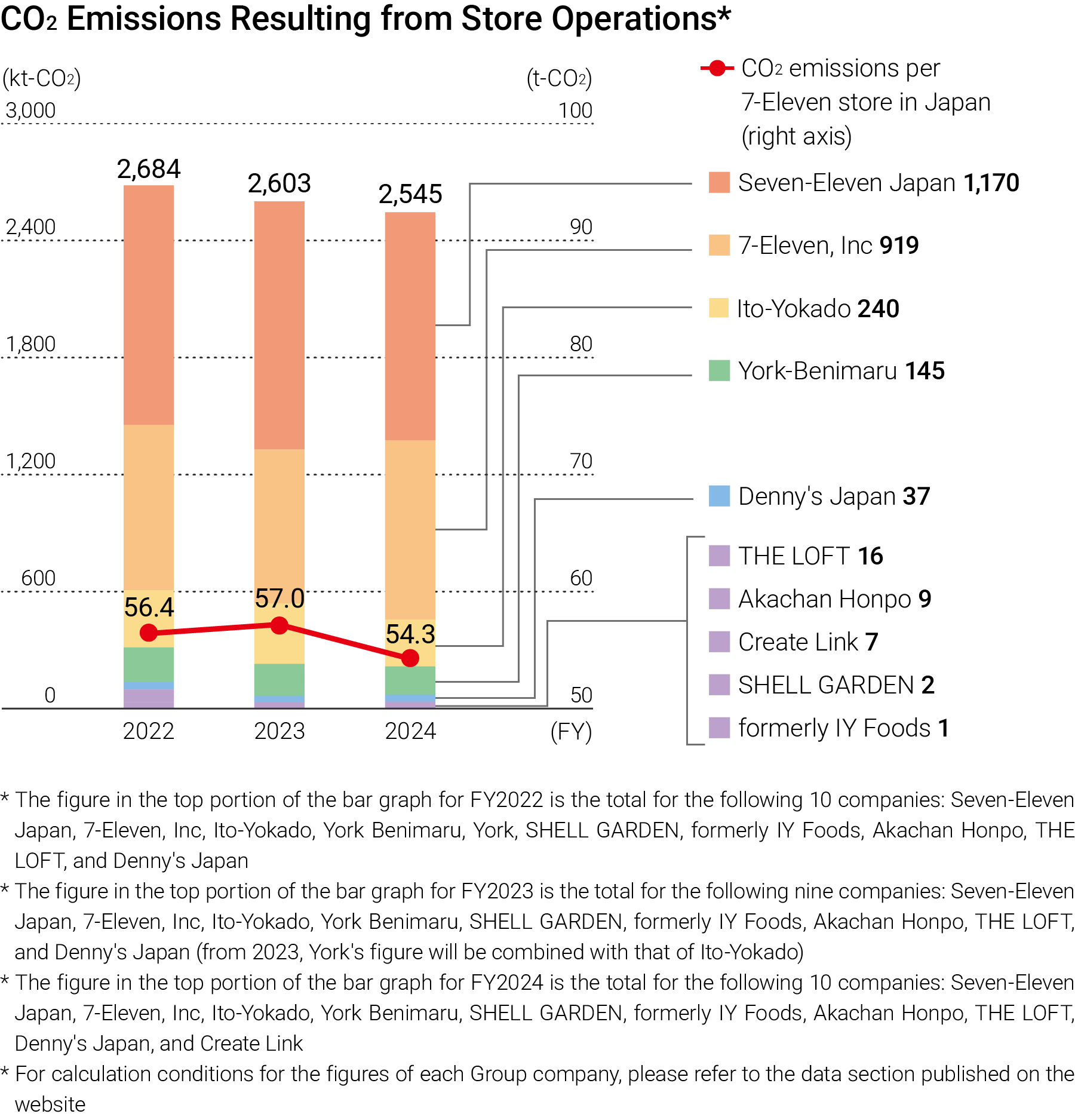
Promotion of Energy Conservation by Employees
Our Group companies are promoting energy-saving activities in stores together with their employees to reduce electricity consumption in stores and to promote environmental education and awareness among employees.
For example, Seven-Eleven Japan has established "Six Priority Energy Conservation Actions" for its stores, and is calling on store employees nationwide to participate in energy conservation initiatives. Alongside this, each store appoints an energy conservation leader from among its employees, with this individual responsible for setting energy conservation goals and driving initiatives, thereby establishing an organized system for the promotion of energy conservation. Operation Field Counselors (OFCs) meanwhile utilize electricity consumption analysis tools to check and validate progress regarding activities at these stores, while also providing counseling to facilitate energy conservation during routine communication with franchise stores.
In addition, Ito-Yokado conducts initiatives tailored to the business characteristics of each company, such as raising awareness among employees about energy-saving activities through posters and other means.
We are promoting the reduction of CO2 emissions by placing the highest priority on reducing electricity consumption in our stores.
Energy Saving Contest
Seven companies* have participated in the group-wide energy-saving contest to promote energy-saving at stores/offices and to expand good practices within the group since FY2023. We collect energy-saving activities carried out by stores of each Group company. The representative director of Seven & i Holdings and representative director & CEO of each company evaluate the entries based on teamwork, ideas, continuity, and each company's original initiatives (including each company's characteristics and local conditions). Each February, the sustainability committee presents the stores and employees that receive the President's Award.
*Seven-Eleven Japan, Ito-Yokado, York-Benimaru, Seven & i Food Systems, THE LOFT, Akachan Honpo, Seven & i Create Link
Promoting the Introduction of Energy-Saving and Energy-Creation Equipment at Stores
To curtail the increase in environmental negative impact proportionate to the increase and enlargement of stores and the expansion of products and services, each Our Group company is installing energy-saving and energy-creation equipment such as LED lighting and solar panels when opening new stores and refurbishing existing ones. Conserving energy at stores also leads to lower costs for energy use.
For example, at Seven-Eleven Japan stores, we are promoting environment-friendly store development by converting all types of lighting to LED, including store signage, sales area lighting, and sign poles. In addition, we have made progress in installing solar panels. Ito-Yokado is committed to the installation of LED lighting and setting up of solar panels at all its stores. Additionally, York-Benimaru has also expanded the number of stores installed with solar panels.
Number of Stores with Solar Panels
| End of February 2022 | End of February 2023 | End of February 2024 | End of February 2025 | |
| Seven-Eleven Japan | 8,775 |
8,823 |
8,962 |
9,025 |
| Ito-Yokado | 19 |
23 |
23 |
26 |
| York-Benimaru | 21 |
42 |
85 |
113 |
| Denny's Japan | 4 |
4 |
4 |
4 |

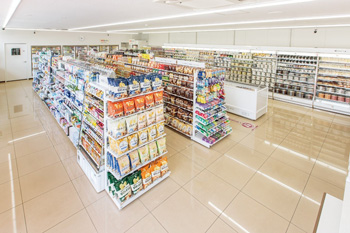
LED lights
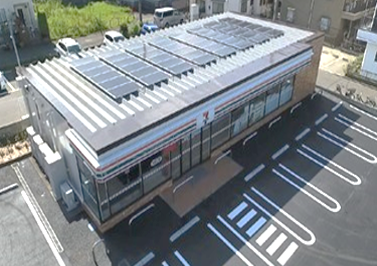
Solar panels
Demonstration Test on Solar Power Generation in Snow-Covered Regions
In August 2024, Seven-Eleven Japan commenced a demonstration test to assess the effectiveness of solar power generation at stores in snowy regions using the VERPA vertical solar power system developed by Air Water Inc. We will actively advance further CO2 emissions reductions through area expansion and additional installations, should various beneficial effects be confirmed as a result of this demonstration test.
Introduction of Large-Scale Solar Power Generation
As part of efforts to reduce CO2 emissions from store operations based on Our Group’s “GREEN CHALLENGE 2050” environmental declaration, a large-scale solar panel generation system went into operation in July 2020 at Ito-Yokado’s Ario Ichihara store. As an effective utilization of Ario Ichihara’s space, solar panels were placed on the roof and are being used to generate some of the electricity consumed by the store. It is now possible to provide about 25% of the total electricity used by Ario Ichihara from the solar panels, as a result of which CO2 emissions from electricity use can be reduced by about 25%. It is one of the largest generation systems of its kind at a commercial facility in Japan.
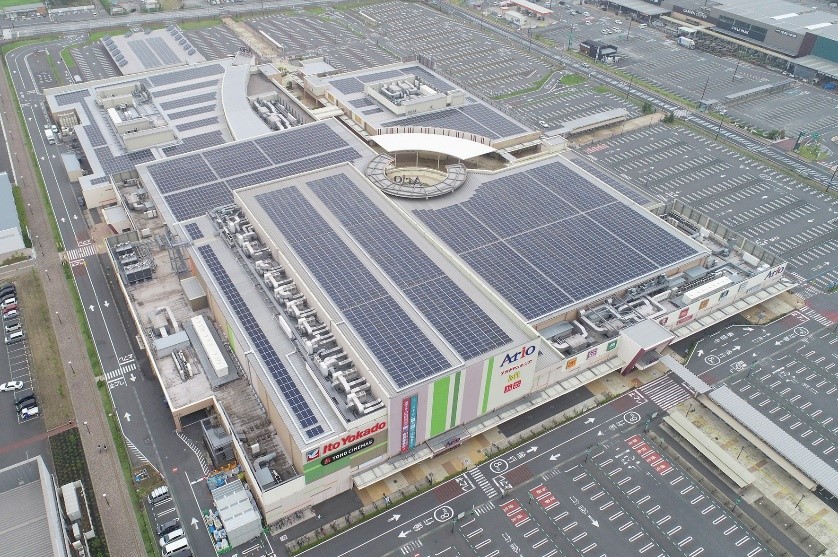
Large-scale solar panels at Ario Ichihara store
Demonstration Test Pilot Store Aiming to Significantly Reduce CO2 Emissions
Seven-Eleven Japan began a demonstration test in June 2023 at its Misato Hikonari 2-chome store in Misato City, Saitama Prefecture, incorporating next-generation technologies to significantly improve on the effectiveness of efforts to reduce CO2 emissions to date.
To begin, the store installed multiple types of solar power generation facilities to “create energy.” In addition to the rooftop-mounted type employed to date, the store introduced parking lot solar panels, colored see-through dye-sensitized solar cells affixed to the glass of store windows, and perovskite solar cells mounted on store walls. The store furthermore also introduced new freezing and refrigeration equipment and defrost control systems to “save energy.” We anticipate reductions of purchased electricity of approximately 60% and reductions of CO2 emissions of approximately 70% compared to FY2013 levels by additionally combining these measures with technologies such as double-glazed windows and LED lighting.
Commencement of Trial Test on 100% Renewable Energy Store Operation
In September 2019, as an initiative based on the Agreement on Cooperation and Collaboration in Promoting SDGs between Seven & i Holdings and Kanagawa Prefecture as well as Seven & i Holdings' “GREEN CHALLENGE 2050” Environmental Declaration, Seven-Eleven Japan started a trial test at 10 7-Eleven stores in Kanagawa Prefecture; all electric energy related to store operation is procured using renewable energy.
4R Energy Corporation’s original batteries—which uses reused batteries from the Nissan LEAF electric vehicle produced by Nissan Motor Corporation—and solar panels with significantly improved electric power generation efficiency made by Kaneka Corporation are installed at stores undergoing the trial. Electric power is used efficiently through in-house power generation. In addition, since November 2019, the procurement of electric power beyond what in-house generation is being supplied by SMART TECH Corporation based on post-FIT※1, which allowed an actual renewable energy rate of 100%※2 when combined with in-house power generation. The electricity generated during the day will be stored and used at night to save energy in stores and strengthen their function as regional infrastructure in the event of a disaster.
In addition to initiatives such as “people- and environment-friendly stores” made thus far, we aim to significantly reduce CO2 emissions through this initiative.
- FIT stands for Feed-in Tariff, a system of fixed-price purchasing. Post-FIT gradually occur from November 2019 as the scheme ends for solar energy.
- Achieve an actual renewable energy rate of 100% by combining the use of electric power generated/stored by stores with that of electric power originating from post-FIT.
Overview of Initiative
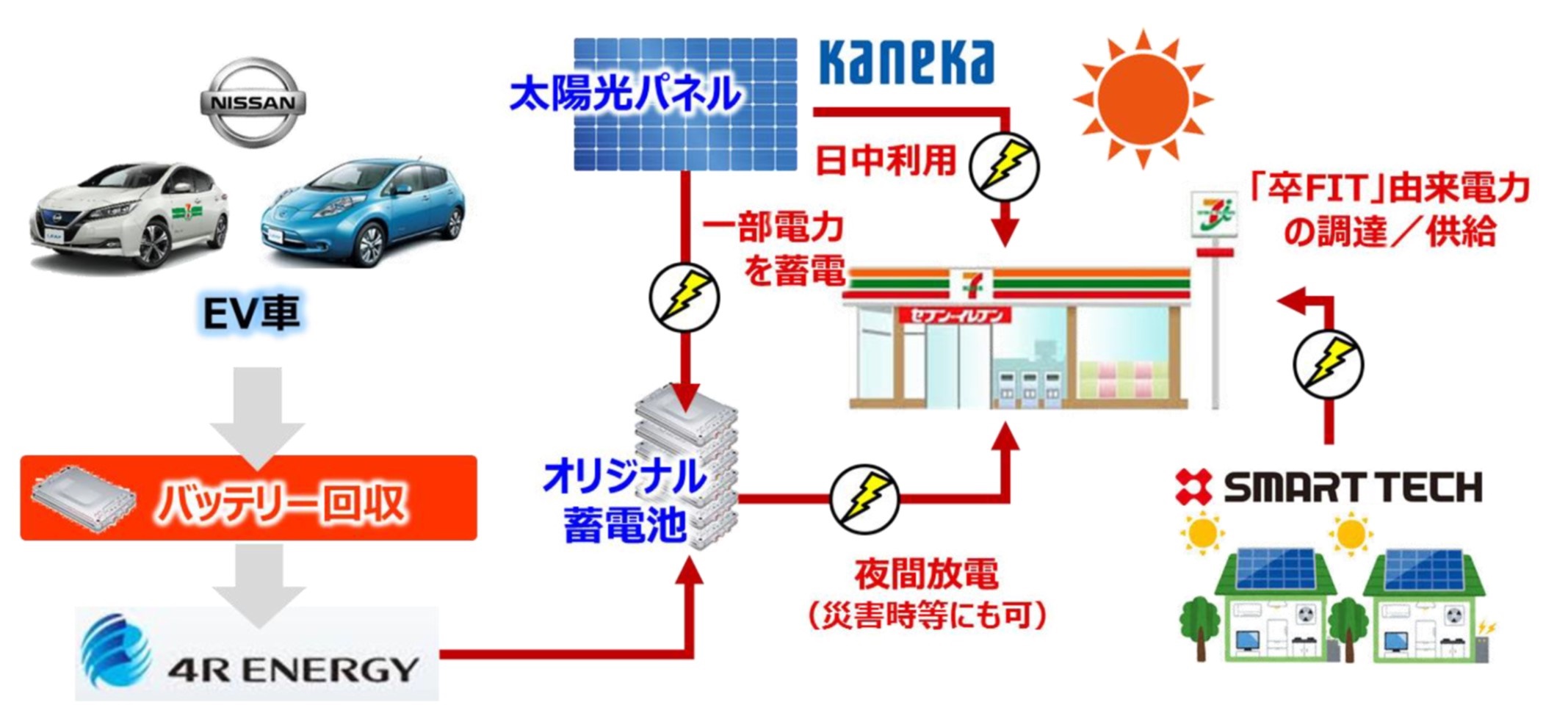
Stores with Hydrogen Stations
Seven-Eleven Japan has signed a comprehensive agreement with Iwatani Corporation regarding the installation of hydrogen stations at stores. In March 2017, the companies opened a store with a hydrogen station in Sendai, Miyagi Prefecture, bringing the total number of hydrogen-station stores to three with the existing stores in Ikegami, Ota-ku, Tokyo and Kariya City, Aichi Prefecture (as of the end of February 2025). The 7-Eleven stores with hydrogen stations have installed pure hydrogen fuel cells to examine the potential for the using hydrogen at retail stores. The aim is to build sites that can serve as community-based social infrastructure capable of supplying products, services, and clean energy at a single point.
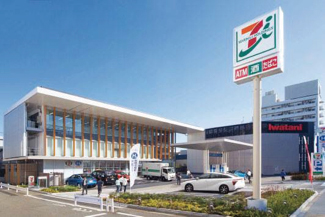
7-Eleven store with a hydrogen station at Ikegami 8-chome, Ota-ku, Tokyo
Introduction of Green Electricity in Stores, Including Japan’s First Offsite PPA
With the aim of realizing 100% renewable energy use in store operations of our Group, Seven & i Holdings and Nippon Telegraph and Telephone Corporation (NTT) have been steadily introducing electricity procurement based on Japan’s first※1 offsite power purchase agreement (PPA) and electricity from NTT group-owned green power generation plants in some stores, since April 2021. This initiative means that 40 7-Eleven stores and the Ario Kameari store now aim to use 100% renewable energy in store operations.
The off-site PPA model refers to power generation facilities that are installed away from demand locations with the power generated being supplied to demand locations. This time, NTT Anode Energy Corporation will set up two solar power generation plants and engage in electricity supply※2 via the transmission and distribution grid. In an offsite PPA, the project developer sets up an offsite renewable energy generation plant specially for companies and local governments who are electricity consumers, and provides long-term supply of electricity. This was Japan’s first offsite PPA. When the electricity from the PPA is insufficient, the rest comes from green electricity generation plants owned by the NTT group, so the electricity used in store operations is 100% renewable energy.
- Based on research by NTT Anode Energy Corporation through hearings with RTS Corporation, etc.
- ENNET Corporation, a subsidiary of NTT Anode Energy Corporation, is the agency providing this electricity supply.
Offsite PPA Diagram
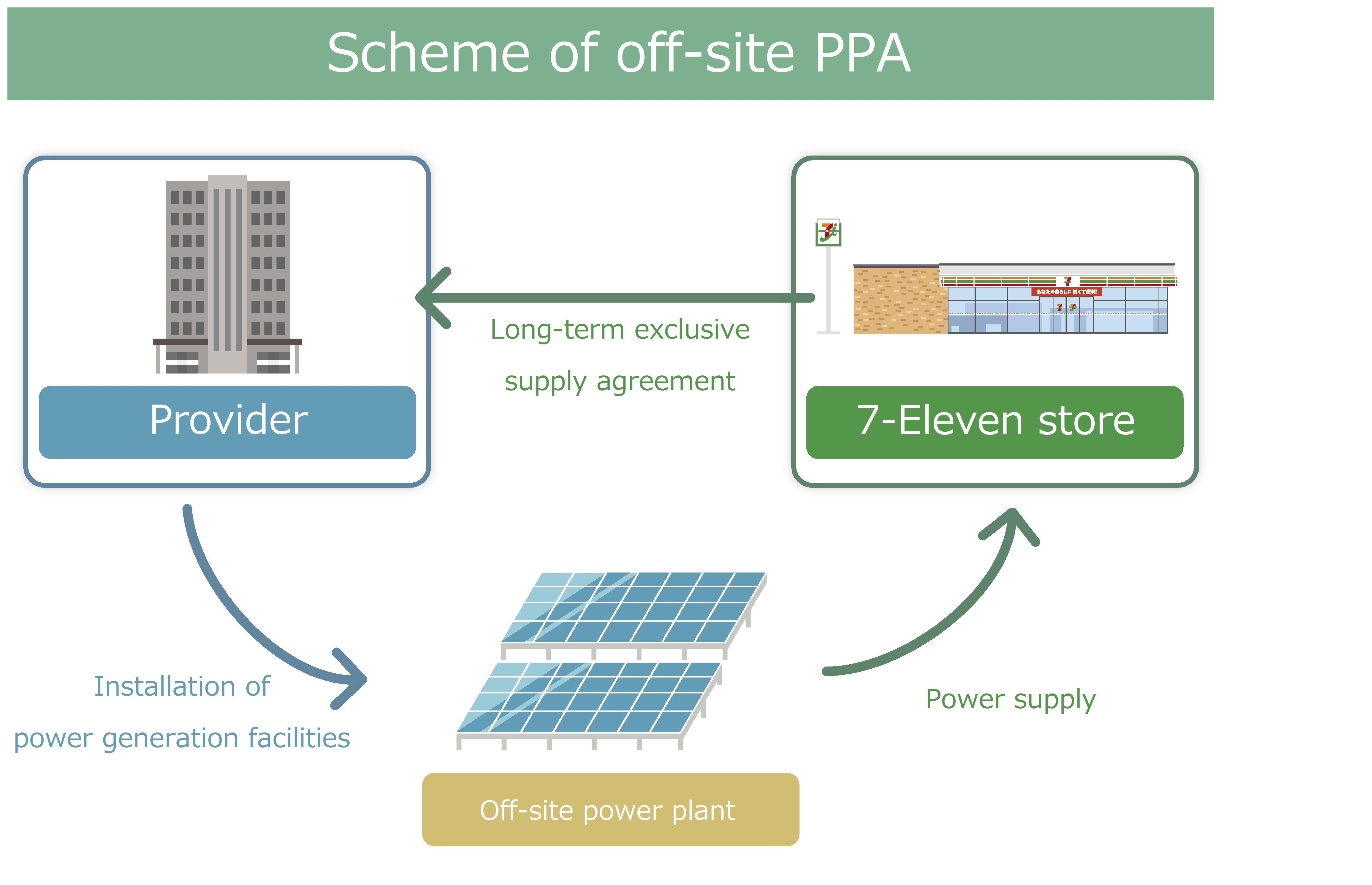
Installation of Electric Vehicle Chargers
Our Group has installed chargers for electric vehicles (EVs) and plug-in hybrid vehicles (PHVs) at stores, including 7-Eleven, Ito-Yokado, York-Benimaru and Denny's etc. to provide a fee-based charging service. As of the end of February 2025, approximately 350 stores in the Group have installed them. The initiative aims to increase the convenience of the commercial facilities and establish a pattern for using EVs and PHVs that can be charged while shopping. It also aims to contribute to the realization of a decarbonized society by promoting the spread of environment-friendly, next-generation cars.
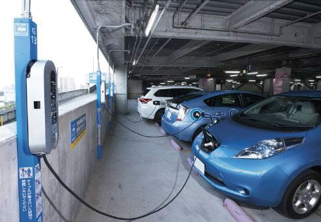
Electric Vehicle Chargers
Environmental Consideration in Leased Vehicles
Seven-Eleven Japan Operation Field Counselors (OFCs), who support franchised store management, use leased vehicles to visit franchised stores. Seven-Eleven Japan has been phasing in hybrid vehicles for these leased vehicles.
Switch to Hybrid Vehicles
| End of February 2023 | End of February 2024 | End of February 2025 | |
| Total number of hybrid vehicles | 4,182 |
3,941 |
4,028 |
| Ratio of hybrid vehicles | 98.2% |
99.8% |
99.9% |
Reduction in CO2 Emissions with the Introduction of 4th Generation ATMs
Seven Bank has been sequentially introducing new ATMs (fourth-generation ATMs) that consume even less power than conventional ATMs since September 2019. The fourth-generation ATMs can reduce power consumption by approximately 40% compared to the third-generation ATMs, which already reduced power consumption by 48% compared to the second-generation ATMs.
Following full completion of replacement and installation in fiscal year ended February 28, 2025, all the approximately 28,000 ATMs are the new model as of the end of March 2025. As a result, the number of ATMs has increased by approximately 3,600 units, while CO2 emissions have been reduced by about 30% compared to the number of units and emission levels before installation of the new ATMs commenced (end of March 2019).
- Conversion of CO2 emission factors at 0.000500t-CO2/kWh
Number of New ATMs (Fourth-Generation ATMs) Installed
| End of February 2022 | End of February 2023 | End of February 2024 | End of February 2025 | |
| Number of New ATMs (Fourth-Generation ATMs) Installed | Approx. 10,000 |
Approx. 13,400 |
Approx. 19,700 |
Approx. 28,000 |
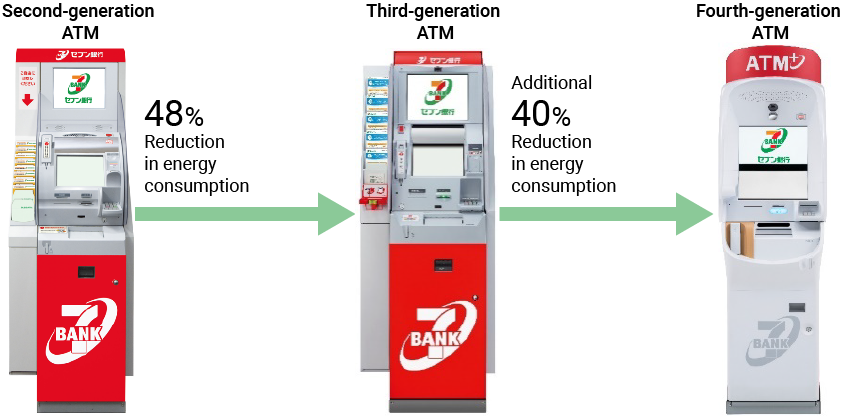
Changes in power consumption by ATMs

